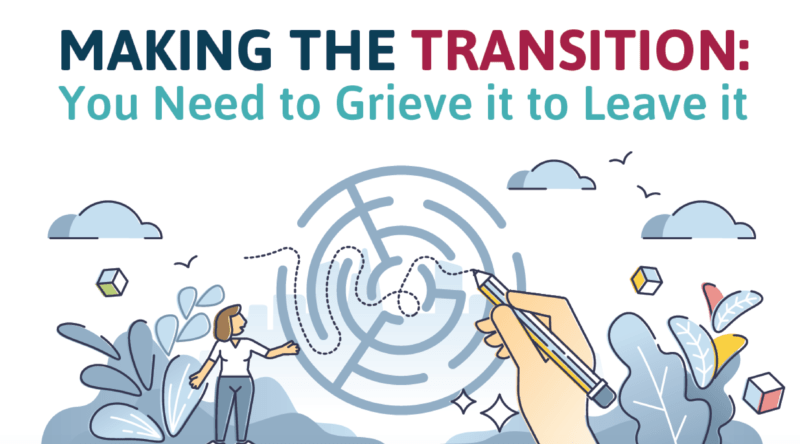
Management — Making the Transition
A few minutes into our phone call, our client began to cry. Working on their career transition and preparing to sell their nursery, it suddenly hit them that their nursery business was their “baby” that they had spent over 30 years nurturing, and the fact they were moving on brought tears of joy and sadness. We empathized with them, and they began to apologize for their emotions. “There is no need to apologize. This is all positive,” we said. “You are grieving the business, and this is an important part of your journey and transition to what’s next.”
According to an Exit Planning Institute (EPI) report, over 75% of business owners who sell their business profoundly regret it within a year after the sale. Many owners end up grieving the loss of their business for years. Many say they have lost their identity and their reason for being. How do we avoid this seller’s remorse, and what steps can we take during the exit planning process to mitigate these feelings of regret?
Chip Conley, founder of the ModernElder Academy, says, “We need to stop retiring from something and retire to something. There are three values people take from their company ownership — a sense of purpose, wellness and community. They seemingly lose all three when they retire, and it can even accelerate their mortality by several years.”
During the exit planning process, it is important to plan where the owner will find their purpose, wellness and community after the sale
or outline a personal vision of what life looks like after the business. It helps frame and answers the question, “What are we retiring to?” In addition, when working with owners on their emotional readiness for the transition, “preparatory grief ” or dealing with grief before the event happens is another way of preparing for the day they sign the papers and hand over the keys.
In 1969, psychiatrist Elisabeth Kübler-Ross identified five stages of grief in her book, “On Death and Dying.” She noted that those experiencing grief on losing a loved one (and a business can be considered a “loved one”) go through five emotional stages: denial, anger, bargaining, depression and acceptance.
There is consistency when these five stages are applied to exit planning. According to Patrick Downing, a psychologist who has worked with exiting business owners, “Grieving the loss of a business is not a seamless process, and there will be flip flops back and forth between the emotional stages — it is not a linear progression. It is all about finding cognitive strategies to help guide you through the emotions that hit you. It helps steer the emotions in a way to help process a sale of the business.” Exit planning itself can be akin to a grieving process.
DENIAL
There is one indisputable fact — 100% of owners eventually will exit their business. It could be through family succession, sale, liquidation, closure, death or any number of reasons — many of which are outside the owner’s control. According to the EPI, 50% of these exits are involuntary, and 40% of business owners lack even a basic continuity plan (should something happen to the owner). When it comes to exit planning, denial is the biggest hurdle. When we talk to business owners and ask when they plan to exit, the typical answer is three to five years. Ask them three to five years from now, and their answer again is three to five years. Denial is clinging to a false reality, and it plays a significant role in why 70 to 80% of businesses don’t sell.
 When we are asked by business owners when they should start exit planning, our answer is always a resounding “NOW!” Whether the owner is in their 20s or their 60s, we have never heard a client complain that they spent too much time planning. Planning leads to business optimization, better decision-making and less owner-centricity, all of which will drive up value in a buyer’s eyes. According to John Dini, author of ”Your Exit Map,” “Five years is a reasonable planning time. Ten years is better. There is no time frame that’s too far out to be thinking about your exit.”
When we are asked by business owners when they should start exit planning, our answer is always a resounding “NOW!” Whether the owner is in their 20s or their 60s, we have never heard a client complain that they spent too much time planning. Planning leads to business optimization, better decision-making and less owner-centricity, all of which will drive up value in a buyer’s eyes. According to John Dini, author of ”Your Exit Map,” “Five years is a reasonable planning time. Ten years is better. There is no time frame that’s too far out to be thinking about your exit.”
Many owners get stuck in denial indefinitely. Overcoming denial is not easy, and it takes a lot of time, effort and focusing on the bigger picture. We start with a preparedness assessment and a valuation because denial often manifests itself in postponing a departure and what an owner perceives as the fair market value for the business.
How can one get past denial? Examine your fears, think about the consequences of doing nothing and identify the irrational beliefs and your reality. Most importantly, talk to someone — a trusted business advisor, friend or loved one you trust and express those fears and emotions. Many owners we talk to express gratitude and relief that they have someone to talk to because they cannot share their concerns with those in the business.
ANGER
Once a business owner identifies those fears, irrational beliefs and emotions that led to their denial — it is only natural to become frustrated. We have seen owners become frustrated when examining their preparedness — “I should have been doing this years ago.” We also see
it when they receive a financial valuation of their business that came in lower than what they were expecting — “Can’t they see what I see?”
Unfortunately, no appraisal can account for the blood, sweat and tears the owner has poured into the business. This stage is also a time of
reluctance to make a change (they can’t see a path forward) and inevitable regrets — things they should’ve done, changes they should’ve made and affixing blame.
How to get over the anger? Lean into it — don’t try to avoid it. Also, give yourself grace. According to Patrick Downing, “This is a time for owners to appreciate what they have accomplished in their business — the clients, customers, and families they have helped. It helps work through the negative cognitive thoughts, beliefs and attitudes surrounding their exit from the business.”
BARGAINING
Hope is not a strategy, and this stage usually involves the hope that an individual can avoid a cause of grief or regain some control after the denial and anger stages. While negotiation is generally welcome in exit planning, this type of bargaining is different, detrimental and usually involves changing the timing or postponing exit planning.
Bargaining is essential because the owner is willing to concede the outcome but wants more time. This stage can be uncertain, but thankfully without the denial and anger that can create major planning obstacles. Eventually, when there is no bargain to be had and the temporary
pause has ended, it leads to the fourth stage: depression.
DEPRESSION
According to Patrick Downing, the most profound depression he has seen in retirements is among high-level entrepreneurs — “They simply can’t deal with what happens when they are just ‘John Smith,’ and not the president of some company.” During this stage, the owner will despair at recognizing their mortality. In this state, the owner may become uncommunicative and closed off, and may also be depressed about a buyer’s offer, the due diligence process, or even his/her future identity or legacy. Some owners struggle mightily with this stage — they are just too emotionally wrapped up in the business.
Consequently, this can be an ideal time for the owner to switch gears, have fun optimizing their business for a sale, and pour themselves into the planning. According to John Dini, “As the company grows in your chosen direction, you could just be having too much fun to leave on your originally planned date.”
There is no antidote for depression quite like having fun and finally making the leap from working in your business to working on your business. In addition, this is where your trusted advisor can keep you focused and be an important sounding board. According to Downing, “Now you have to redefine your life, and this can be a creative time with no playbook but starting at ground level again.” Fun for some, scary and uncertain for others, but necessary.
ACCEPTANCE
We initially thought that our clients, the ones who burst into tears, were in a state of depression. They assured us it was quite the opposite. “I can’t fight it, so I might as well prepare for it. I’m going to be okay and ready for what comes next.” Acceptance! They have since been active in optimizing their business and preparing it for sale. Having just met with a business broker — their target date to sell is this fall.
Downing says, “Exiting a business is often an issue of identity. Is your work who you are? Preparatory grieving of the business is an important step when it comes to an end. So many do not prepare for what happens when they sell a company.”
You can have the finest advisors, achieve value for your life’s work beyond your expectations, and be financially set for your retirement.
However, if you are not ready emotionally — then you could be one who “profoundly regrets” the sale of your business and end up grieving it for years. Exit planning is not just about the transaction but also the transition of your life. Grieving the loss of your business upfront will allow you to leave it on your terms.









 Video Library
Video Library 


















